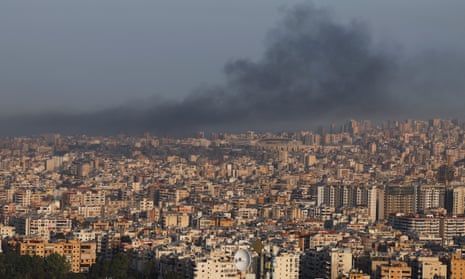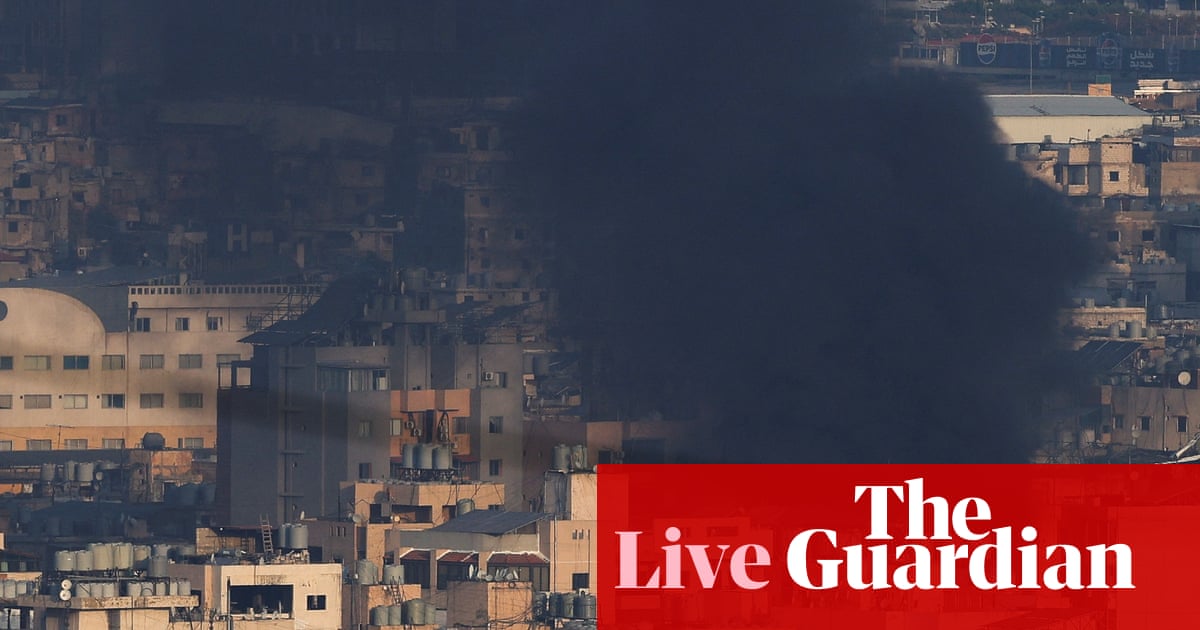Strikes reportedly hit south Beirut after Israeli military evacuation warning
Strikes reportedly hit Beirut’s southern suburbs early on Wednesday morning, the first time in days the area has been targeted.
Reuters witnesses reported hearing a blast and seeing a plume of smoke. Black smoke billowed from between buildings in Haret Hreik after the strike, AFP reported, before witnessing a second strike moments later.
The strikes came after the IDF urged residents to immediately evacuate a specific building in the southern suburbs of Beirut early on Wednesday, warning in a statement on social media website X that it will hit Hezbollah targets there soon.

“You are located near facilities and interests affiliated with Hezbollah, which the IDF will work against in the near future” the statement in Arabic said, addressing Haret Hreik residents.
The Israeli military has repeatedly bombarded south Beirut in recent weeks, as well as carrying out deadly strikes elsewhere in the capital and across Lebanon.
At least 1,356 people have been killed in Lebanon since Israel escalated its bombing last month, according to an AFP tally of Lebanese health ministry figures, though the real toll is likely higher.
#عاجل ‼️ انذار عاجل جديد إلى سكان الضاحية الجنوبية وتحديدًا المتواجدين في المبنى المحدد في الخارطة والواقع في حارة حريك
🔴أنتم متواجدون بالقرب من منشآت ومصالح تابعة لحزب الله حيث سيعمل ضدها جيش الدفاع على مدى الزمني القريب
🔴من أجل سلامتكم وسلامة أبناء عائلتكم عليكم اخلاء هذا… pic.twitter.com/cigjAse6iL— افيخاي ادرعي (@AvichayAdraee) October 16, 2024
Key events
Iran’s foreign minister Abbas Araqchi is visiting Jordan, Egypt and Turkey as part of Tehran’s diplomatic outreach to countries in the region “to end genocide, atrocity and aggression”, the Iranian foreign ministry’s spokesperson said on Wednesday in a post on X, Reuters reports.
Israeli army says it struck Hezbollah underground weapons storage facility in southern Beirut
The IDF says it has hit an underground Hezbollah strategic weapons storage depot in the Dahiyeh area in the southern suburbs of Beirut, in a statement posted on X.
מטוסי קרב של חיל האוויר תקפו לפני זמן קצר, בהכוונה מודיעינית מדויקת של אגף המודיעין, אמצעי לחימה אסטרטגיים שאוחסנו במחסן תת קרקעי של ארגון הטרור חיזבאללה בדאחייה שבביירות.
טרם התקיפה ננקטו צעדים רבים על מנת לצמצם את הסיכוי לפגיעה באזרחים, הכוללים אזהרות מקדימות לאוכלוסייה באזור
— צבא ההגנה לישראל (@idfonline) October 16, 2024
Strikes reportedly hit south Beirut after Israeli military evacuation warning
Strikes reportedly hit Beirut’s southern suburbs early on Wednesday morning, the first time in days the area has been targeted.
Reuters witnesses reported hearing a blast and seeing a plume of smoke. Black smoke billowed from between buildings in Haret Hreik after the strike, AFP reported, before witnessing a second strike moments later.
The strikes came after the IDF urged residents to immediately evacuate a specific building in the southern suburbs of Beirut early on Wednesday, warning in a statement on social media website X that it will hit Hezbollah targets there soon.
“You are located near facilities and interests affiliated with Hezbollah, which the IDF will work against in the near future” the statement in Arabic said, addressing Haret Hreik residents.
The Israeli military has repeatedly bombarded south Beirut in recent weeks, as well as carrying out deadly strikes elsewhere in the capital and across Lebanon.
At least 1,356 people have been killed in Lebanon since Israel escalated its bombing last month, according to an AFP tally of Lebanese health ministry figures, though the real toll is likely higher.
#عاجل ‼️ انذار عاجل جديد إلى سكان الضاحية الجنوبية وتحديدًا المتواجدين في المبنى المحدد في الخارطة والواقع في حارة حريك
🔴أنتم متواجدون بالقرب من منشآت ومصالح تابعة لحزب الله حيث سيعمل ضدها جيش الدفاع على مدى الزمني القريب
🔴من أجل سلامتكم وسلامة أبناء عائلتكم عليكم اخلاء هذا… pic.twitter.com/cigjAse6iL— افيخاي ادرعي (@AvichayAdraee) October 16, 2024
Opening summary
A strike hit south Beirut early on Wednesday, Reuters and Agence-France Presse reported, after the Israeli army issued an evacuation warning for a specific building in Beirut’s southern suburbs, indicating it will hit Hezbollah targets there soon.
Reuters witnesses reported hearing a blast and seeing a plume of smoke. Black smoke billowed from between buildings in Haret Hreik after the strike, AFP reported.
Separately, Israel says it plans to address US concerns after the Biden administration warned Israel it risks losing access to US weapons funding if it does not improve the flow of humanitarian aid into Gaza within the next 30 days.
The warning came in the form of a four-page letter dated 13 October written jointly by Antony Blinken, the US secretary of state, and Lloyd Austin, the defence secretary, to their Israeli counterparts.
An Israeli official in Washington told Reuters that Israel was reviewing the letter.
“Israel takes this matter seriously and intends to address the concerns raised in this letter with our American counterparts,” the official said.
The letter, which restates US policy toward humanitarian aid and arms transfers, was sent amid deteriorating conditions in northern Gaza and an Israeli airstrike on a hospital tent site in central Gaza that killed at least four people and burned others. It came to light after being posted on social media by Barak Ravid, an Israeli journalist who works for Axios, after apparently being leaked.
In other developments:
-
Hezbollah’s acting leader said the Lebanese militant group is focused on “hurting the enemy” by targeting Haifa and other parts of Israel, including Tel Aviv. Sheikh Naim Kassem, Hezbollah’s deputy chief, vowed in a televised speech to “defeat our enemies and drive them out of our lands.” It was his third appearance since Hezbollah leader Hassan Nasrallah was killed in an Israeli airstrike in a southern suburb of Beiruts.
-
Benjamin Netanyahu’s office said that Israel will decide alone on the form of any retaliation to Iran’s missile attack earlier this month, although it would listen to advice from Washington. The comments came after reports that the Israeli prime minister had given an assurance to the US president, Joe Biden, that Israel would not attack sites associated with Iran’s nuclear programme or oilfields before the US presidential election. A statement from Netanyahu’s office on Tuesday denied any such commitment.
-
Israel continued to press its offensive in Gaza, with airstrikes killing a further 50 Palestinians on Tuesday. Palestinian health officials said at least 17 people were killed by Israeli fire near Al-Falouja in Jabalia, the largest of Gaza’s eight historic refugee camps, while 10 others were killed in Bani Suhaila in eastern Khan Younis in the south when an Israeli missile struck a house. Later on Tuesday, the Gaza health ministry said one doctor was killed when he tried to help the people wounded by Israeli strikes in Al-Falouja in Jabalia. It said Israel’s military offensive in the Gaza Strip has killed at least 42,344 Palestinians and wounded 99,013 since 7 October 2023.
-
The Israeli military said about 50 projectiles were fired from Lebanon at the country’s north early Wednesday, without any reports of casualties. “Some of the projectiles were intercepted and fallen projectiles were identified in the area,” a military statement said, while Hezbollah said it launched “a large salvo of missiles” at the town of Safed.
-
The UN human rights office said on Tuesday the Israeli military appeared to be “cutting off North Gaza completely from the rest of the Gaza Strip.” Tens of thousands of civilians have been trapped in the densely populated northern Gaza neighbourhood of Jabaliya by a new Israeli military operation there. Most are suffering appalling conditions and mounting casualties from Israeli shelling, bombs and missiles. The director of Kamal Adwan hospital, one of the three hospitals in northern Gaza, said they were facing serious shortages of food, medication and fuel.
-
In Lebanon, Israel’s military launched several strikes in eastern areas on Tuesday, a day after Netanyahu vowed to “mercilessly strike Hezbollah in all parts of Lebanon – including Beirut”. The Lebanese health ministry said 41 people were killed and 124 were injured by Israeli strikes in Lebanon on Monday, meaning a total of 2,350 people have been killed in Lebanon since the fighting began between Hezbollah and Israel last October and the number of wounded has risen to 10,906. A US state department spokesperson said Washington has “made clear to Israel that we oppose the bombing campaign that they have been launching in recent weeks in Beirut.”
-
The UN rights office said an Israeli airstrike on an apartment building in northern Lebanon that killed at least 22 people needs to be independently investigated. It said it had received reports that most of the victims of the Israeli airstrike on the northern Lebanon village of Aitou were women and children. “We have real concerns with respect to … the laws of war,” a UNHCR spokesperson said.
-
More than a quarter of Lebanon is now affected by Israeli evacuation orders, according to the UN’s refugee agency. “People are heeding these calls to evacuate, and they’re fleeing with almost nothing,” Middle East director Rema Jamous Imseis told journalists on Tuesday. More than 1.2 million people in Lebanon have been displaced over the past year. More than 400,000 children in Lebanon have been displaced in the past three weeks, a top official with the UN children’s agency said Monday, warning of a “lost generation”.
-
Israeli troops cleared landmines and established new barriers on the frontier between the occupied Golan Heights and a demilitarised strip bordering Syria, according to a report, in a sign Israel may expand its ground operations against Hezbollah while bolstering its own defences. The move suggests Israel may seek to strike Hezbollah for the first time from farther east along Lebanon’s border, at the same time creating a secure area from which it can freely reconnoitre the armed group and prevent infiltration, security sources told Reuters.
-
An assailant shot dead an Israeli policeman and wounded five other people near the southern city of Ashdod on Tuesday in what police called a “terrorist” attack. The gunman was killed during the attack at the Yavne interchange along the highway connecting Ashdod to Tel Aviv, authorities said.
-
Netanyahu told Emmanuel Macron, the French president, in a phone call on Tuesday that he was opposed to agreeing to a “unilateral ceasefire” in Lebanon, his office said. The call came as Macron increased pressure on Israel to abide by UN decisions, telling his cabinet that the Israeli leader “must not forget that his country was created by a decision of the UN”, according to a report.
-
Italy’s prime minister, Giorgia Meloni, said she will visit Lebanon on Friday as she demanded security guarantees from Israel for her country’s troops there just days after UN peacekeeper bases came under attack. Italy’s government has been a strong supporter of Israel in the year since Hamas’s 7 October attacks but has sharply criticised attacks on Unifil and Israeli calls for the peacekeepers to withdraw.
-
The UK Foreign Office announced sanctions against seven organisations that support illegal Israeli settlers in the West Bank, but held back from penalising two extremist members of the Israeli government, finance minister Bezalel Smotrich and the national security minister Itamar Ben-Gvir.











